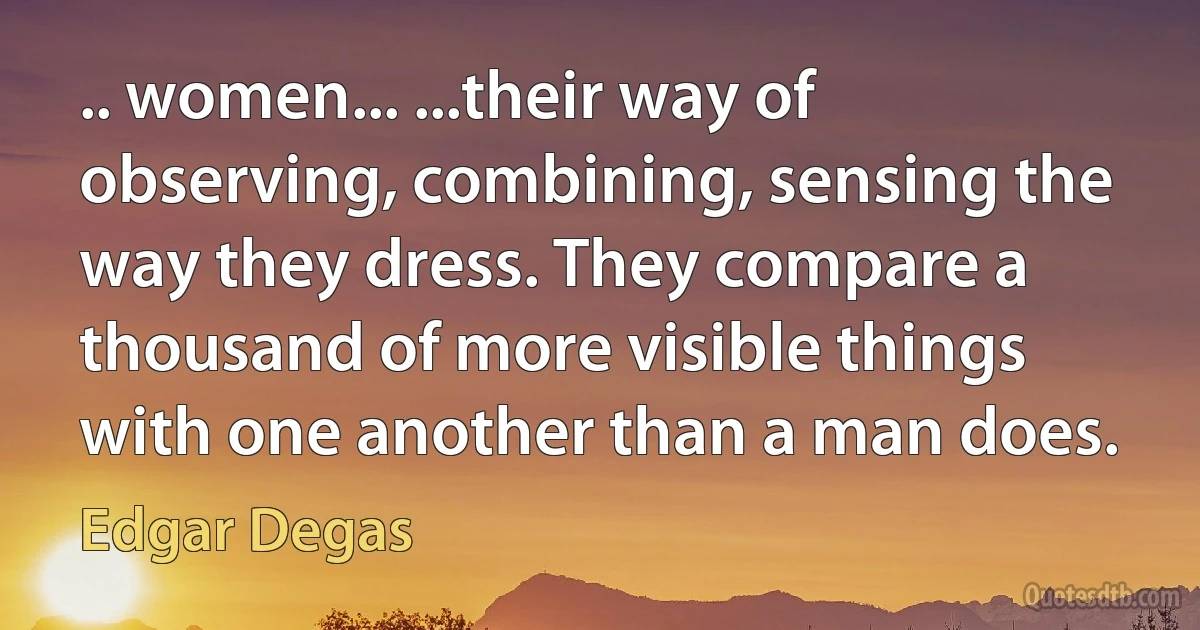Observing Quotes - page 4
I believed before that (journey to Italy in 1875)... that movement was the whole secret of this art, and I put my models into positions like those of Michael Angelo. But as I went on observing the free attitudes of my models I perceived that they possessed thèse naturally^ and that Michael Angelo had not preconceived them, but merely transcribed them according to the Personal inspiration of human beings moved by the need of action. I went to Rome to look for what may be found everywhere : the latent heroic in every natural movement.

Auguste Rodin
In a certain sense all knowledge is inductive. We can only learn the laws and relations of things in nature by observing those things. But the knowledge gained from the senses is knowledge only of particular facts, and we require some process of reasoning by which we may collect out of the facts the laws obeyed by them. Experience gives us the materials of knowledge: induction digests those materials, and yields us general knowledge. When we possess such knowledge, in the form of general propositions and natural laws, we can usefully apply the reverse process of deduction to ascertain the exact information required at any moment. In its ultimate foundation, then, all knowledge is inductive-in the sense that it is derived by a certain inductive reasoning from the facts of experience.

William Stanley Jevons
In every third world age (Dvapara), Vishnu, in the person of Vyasa, in order to promote the good of mankind, divides the Veda, which is properly but one, into many portions. Observing the limited perseverance, energy, and application of mortals, he makes the Veda fourfold, to adapt it to their capacities; and the bodily form which he assumes, in order to effect that classification, is known by the name of Veda-vyasa. Of the different Vyasas in the present Manvantara and the branches which they have taught, you shall have an account. Twenty-eight times have the Vedas been arranged by the great Rishis in the Vaivasvata Manvantara... and consequently eight and twenty Vyasas have passed away; by whom, in the respective periods, the Veda has been divided into four. The first... distribution was made by Svayambhu (Brahma) himself; in the second, the arranger of the Veda (Vyasa) was Prajapati...

Vyasa
The folksong collectors Bartok (Hungary) and Plicka (Czechoslovakia) notated the perceived interval deviations with a plus or minus sign (+,-). Older folksong collectors had notated all the intervals in the system of semitones, not observing the finer modifications of intervals. This first gained currency from the phongraph and tape recordings of folk music from various lands....From folksong I learned to perceive melodic intervals a little smaller or greater than those of the semitone-system....In my youth it often happened that the folk singers, who during the intermissions of dance festivals sang songs of "their kind," deviating from the semitone system, demanded that the first violinist of the Wisowitzer Kapelle play "their" melody just as they sang it. Once a tempermental singer threatened to strike the double-bass player with a beer mug if he didn't "play along" with the song, exactly as he sang it.

Alois Hába
The point I wish to make is that I became aware that we discipline our minds to see only certain aspects of the world; life is complicated, and we need all our wits about us to deal with its complexities. There would be no great point in having second sight or thaumaturgic powers for most of us. But it is worth observing that they can generally be developed where needed.

Colin Wilson
You don't paint the way someone, by observing his life, thinks you have to paint, you paint the way you have to in order to give. That's life itself, and someone will look and say it is the product of knowing, but it has nothing to do with knowing, it has to do with giving. The question about knowing will naturally be wrong. When you've finished giving, the look surprises you as anyone else. Some painters talking about painting are like a lot of kids dancing at a prom. An hour later you are too shy to get out on the floor.

Franz Kline
Imagination is a very precise thing, you know - it is not fantasy. Remember, the other day I gave you the example of what I mean, what the difference between fantasy and imagination is. I gave you the example of the man who invented the of the man who invented the wheel while he was observing another man walking.

Jacques Lipchitz
I did not teach him everything he knows. He just absorbed everything I knew. The rest he discovered himself by asking, probing, begging, watching, observing, reading, demanding, investigating, improvising, experimenting, experiencing, learning and not being afraid of stretching himself beyond his own limits. I only gave him the platform and the opportunity to discover himself. In the process, I was blessed enough to discover myself.

Kamal Haasan
Computer science is an empirical discipline. [...] Each new machine that is built is an experiment. Actually constructing the machine poses a question to nature; and we listen for the answer by observing the machine in operation and analyzing it by all analytical and measurement means available. Each new program that is built is an experiment. It poses a question to nature, and its behavior offers clues to an answer.

Allen Newell
We are observing ourselves being observed by the painter, and made visible to his eyes by the same light that enables us to see him. And just as we are about to apprehend ourselves, transcribed by his hand as though in a mirror, we find that we can in fact apprehend nothing of that mirror but its lusterless back. The other side of a psyche.

Michel Foucault
They drew near, and observing that they were very comfortable standing before the warm fire, they put on logs and, while thus keeping it alive, brought up other people to it, showing them by signs how much comfort they got from it. In that gathering of men, at a time when utterance of sound was purely individual, from daily habits they fixed upon articulate words just as these had happened to come; then, from indicating by name things in common use, the result was that in this chance way they began to talk, and thus originated conversation with one another.

Vitruvius
And so, as they kept coming together in greater numbers into one place, finding themselves naturally gifted beyond the other animals in not being obliged to walk with faces to the ground, but upright and gazing upon the splendor of the starry firmament, and also in being able to do with ease whatever they chose with their hands and fingers, they began in that first assembly to construct shelters. Some made them of green boughs, others dug caves on mountain sides, and some, in imitation of the nests of swallows and the way they built, made places of refuge out of mud and twigs. Next, by observing the shelters of others and adding new details to their own inceptions they constructed better and better kinds of huts as time went on.

Vitruvius
You see, whether you can draw like this or not, being able to think up this kind of design, it depends on whether or not you can say to yourself, 'Oh, yeah, girls like this exist in real life.' If you don't spend time watching real people, you can't do this, because you've never seen it. Some people spend their lives interested only in themselves. Almost all Japanese animation is produced with hardly any basis taken from observing real people, you know. It's produced by humans who can't stand looking at other humans. And that's why the industry is full of otaku!

Hayao Miyazaki
![[looking at the dead body of his first wife Camille, 5 Sept 1879], watching her tragic forehead, almost mechanically observing the colors which death was imposing on her rigid face. Blue. Blue, yellows, grey, what do I know?... How natural to to want to reproduce the last image of her, who was leaving us for ever. But even before the idea came to me to record her beloved features, something in me automatically responded tot the shocks of colours. I just seem to be compelled in an unconsciousness activity, the one I engage in every day, like an animal turning in its mill. (Claude Monet)](https://cdn.quotesdtb.com/img/quotes_images_webp/87/claude-monet-activity-almost-302587.webp)


